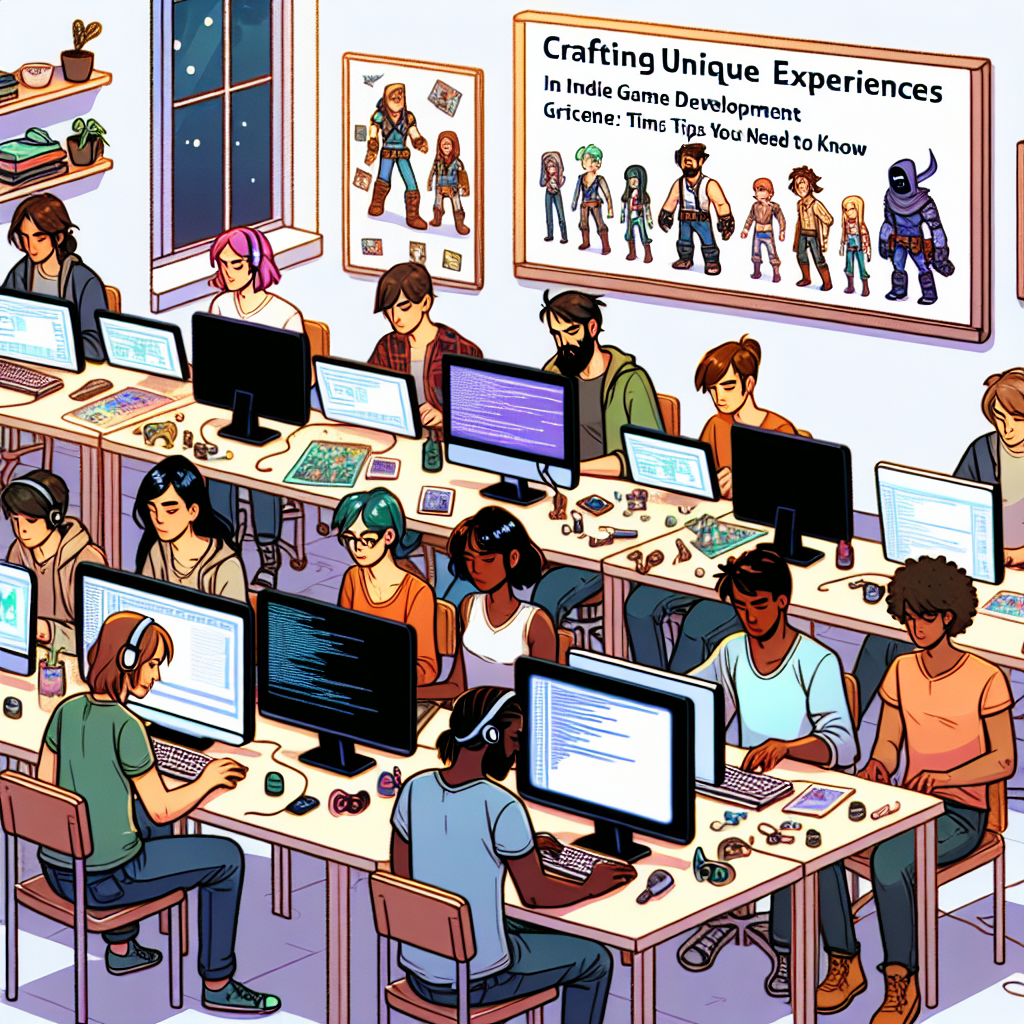Crafting Unique Experiences: Indie Game Development Tips You Need to Know
In the realm of gaming, indie developers have carved out a niche, proving that imagination, creativity, and innovation can stand shoulder to shoulder with big-budget studios. The beauty of indie game development lies in the freedom it offers to experiment, try new ideas, and create unique experiences that resonate with players on a personal level. However, navigating the path of indie game development can be challenging. Here are some essential tips to help you craft distinct and engaging experiences in your next indie project.
1. Embrace Your Unique Vision
The first step in creating a unique game is to embrace your individuality. What makes your perspective different? Dive deep into your experiences and interests, drawing from them to inspire your game’s premise, characters, and world. Whether it’s a personal story, a cultural experience, or a niche interest, leveraging your unique voice will set your game apart in a crowded market.
2. Prioritize Gameplay Over Graphics
While stunning graphics can enhance a game’s visual appeal, it’s the gameplay that keeps players engaged. Many successful indie games have minimalistic graphics but are beloved for their innovative mechanics and compelling narratives. Focus on creating an immersive gameplay experience, including intuitive controls and unique challenges. Strive for depth and engagement rather than sheer visual splendor.
3. Incorporate Strong Narrative Elements
Storytelling is a vital aspect of game development that can transform a good game into a great one. Indie games often excel in their storytelling because they’re not bound by conventional industry norms. Consider building a narrative that interests you, and allow it to guide the design of your game. Whether it’s through compelling characters, evocative dialogue, or immersive world-building, a strong narrative can elevate your game and draw players into your universe.
4. Iterate and Seek Feedback
The beauty of indie development often lies in the iterative process. Don’t be afraid to share your work-in-progress with friends, fellow developers, and potential players. Gather feedback, be open to criticism, and use it to refine your game. Iteration is key; many great games are born from a cycle of testing, adapting, and improving.
5. Foster Community Engagement
Building a community around your game can amplify its success. Engage early and often with players through social media, forums, and events. Share your development process, showcase your work, and invite feedback. This not only provides you with insights that can help improve your game, but it also fosters loyalty amongst future players who feel invested in your journey.
6. Experiment with Mechanics
Indie developers have the freedom to experiment with game mechanics without the constraints often imposed by larger studios. Don’t shy away from taking risks. Try blending genres, innovating with game mechanics, or incorporating non-traditional gameplay elements. Games like "Katamari Damacy" and "Journey" have garnered acclaim for their unique approaches. These bold choices can capture attention and create engaging experiences that players remember.
7. Keep Your Scope Manageable
One of the most common pitfalls for indie developers is overambition. It’s easy to envision an epic game that spans vast worlds and intricate narratives, but it’s crucial to set realistic goals based on your resources and team size. Start with a core concept, and aim to develop a polished, complete product. Once that’s successful, you can consider expanding your project or creating sequels.
8. Utilize Available Resources
Today’s indie developers are fortunate to have numerous resources available. From game engines like Unity and Unreal Engine to forums and online courses, the tools to bring your vision to life are more accessible than ever. Take advantage of the wealth of knowledge in the indie game community. Join game jams, collaborate with others, and continually seek to improve your craft.
9. Market Early and Often
Don’t wait until your game is complete to begin marketing. Start building your brand and presence early in the development process. Regular updates, devlogs, and social media engagement can create anticipation and a built-in community long before launch. Consider using platforms like Steam, Itch.io, or Epic Games Store to reach broader audiences and gauge early interest in your project.
10. Find Joy in the Process
Lastly, remember that game development should be fun! While it can be stressful and challenging, it’s essential to retain your passion and joy throughout the development process. Celebrate small victories, learn from setbacks, and continuously remind yourself why you embarked on this journey in the first place.
In conclusion, indie game development allows for unparalleled creative freedom, where the only limit is your imagination. By embracing your unique vision, iterating based on feedback, and focusing on gameplay and narrative, you can craft unforgettable experiences that resonate with players. So take these tips to heart, channel your passion, and begin creating a game that captivates and inspires. The gaming world is waiting for your unique contribution!




